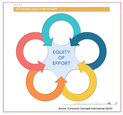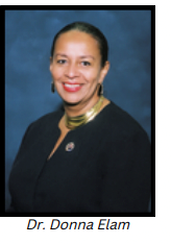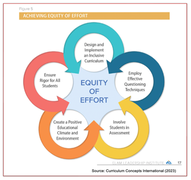|
A Conversation with Dr. Donna Elam, Elam Leadership Institute  Equity of Effort: A New Habit of Mind Dr. Donna Elam’s opening keynote at the 2022 RISE Conference, on Equity and Effort as a New Habit of Mind, resonated with all of us. Why? Why shall we talk about equity as effort, and as a habit of mind? “The words ‘equity’ and ‘effort’ were deliberately selected to enable educators to understand creating a learning environment that to impact equitable outcomes and opportunities for all groups of students must be intentional. This intentionality establishes a perspective that becomes a habit, a habit of mind,” explains Dr. Elam during our zoom conversation a few days ago. She emphasizes that the word ‘habit’ implies practices done, routinely and purposefully. Therefore, there is an intentional effort to implement equitable practices. Prompted by this succinct but powerful response, the conversation soon shifted to the stories behind the success of schools and districts nationwide that have resulted from the implementation of research-based practices in equity, which are summarized in Dr. Elam’s Equity Framework, detailed below.  Education & Career Dr. Elam’s clear and apparently simple affirmation about making the equity perspective a habit of mind is based on her extensive work with schools and school districts nationwide, and her own research. Dr. Donna Elam is the founder of the Elam Leadership Institute and serves as a senior advisor for equity at the federally funded National Comprehensive Center at Westat, which assists regional centers, states, and local clients to address priority needs and tackle high-leverage challenges in education. Dr. Elam's formal education took place in Catholic schools in New York and she graduated Magna cum Laude from York College, majoring in elementary education and specializing in early childhood. She received both her Master and Doctoral degrees from New York University. Throughout her professional career, she has worked to dismantle educational systems cited for discrimination against children of color. Dedicated to public service, spirituality, and humanitarianism, her leadership model is infused with hope. Educators can learn how to lead towards critical social justice through persistence, connectivity, and the dialectical purposes of service and leadership from her pedagogy of struggle. Implementing Research-Based Practices in Equity Dr. Elam’s Equity of Effort Framework uses an asset-based approach for an equity mindset that operationalizes leadership vision for equitable outcomes for all groups of students. To that purpose, educational leaders as well as teachers need to collect, analyze and reflect on data that pertain to student learning, perceptions we have about the students, their competence and performance, as well as the demographics. Some of the questions that educators need to address include:
 At this point in our conversation, Dr. Elam proceeded to distinguish Equality from Equity. ”Equality, she observed, is a state of being the same or uniform, and although equality is beneficial, it does not address the specific needs of all groups of students. [Whereas] Equity takes existing inequalities into account to ensure all students are afforded the resources, access, and opportunities they need to be successful.” The steps to implementing research-based practices in equity are:
Thank you, Dr. Elam, for your time and for your sharing wisdom.
0 Comments
Your comment will be posted after it is approved.
Leave a Reply. |
Archives
January 2024
Categories
All
|
